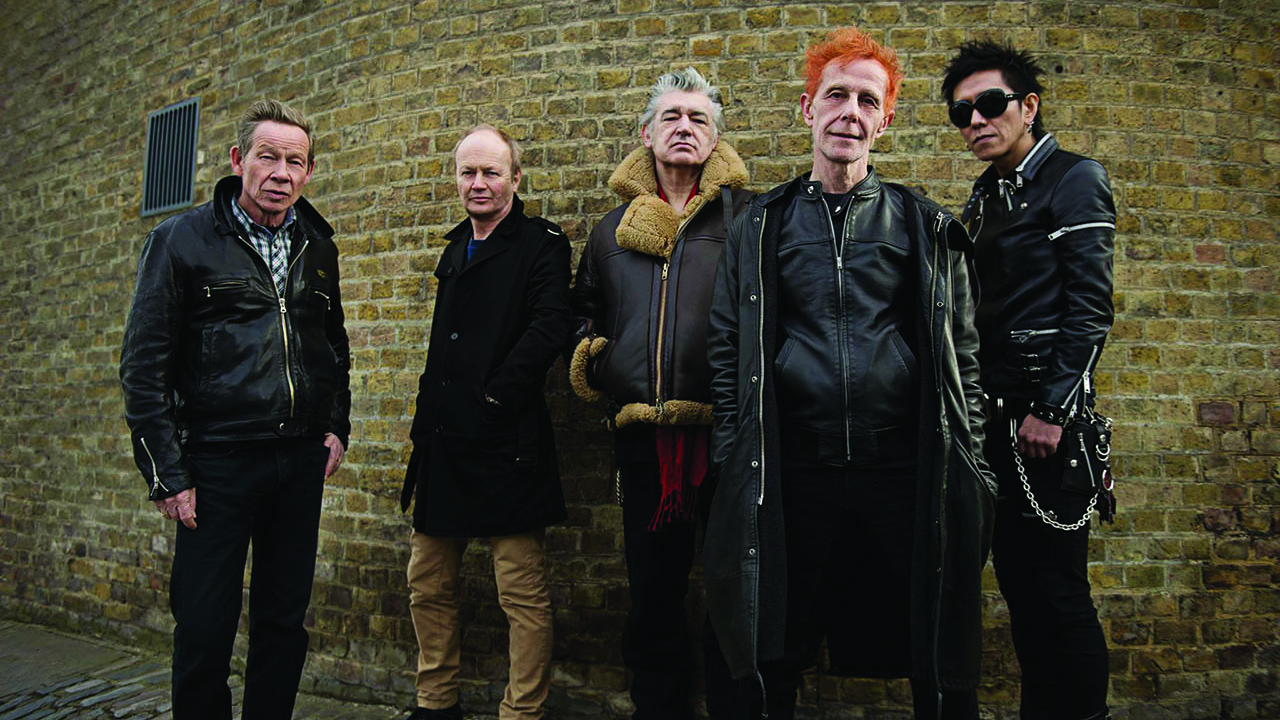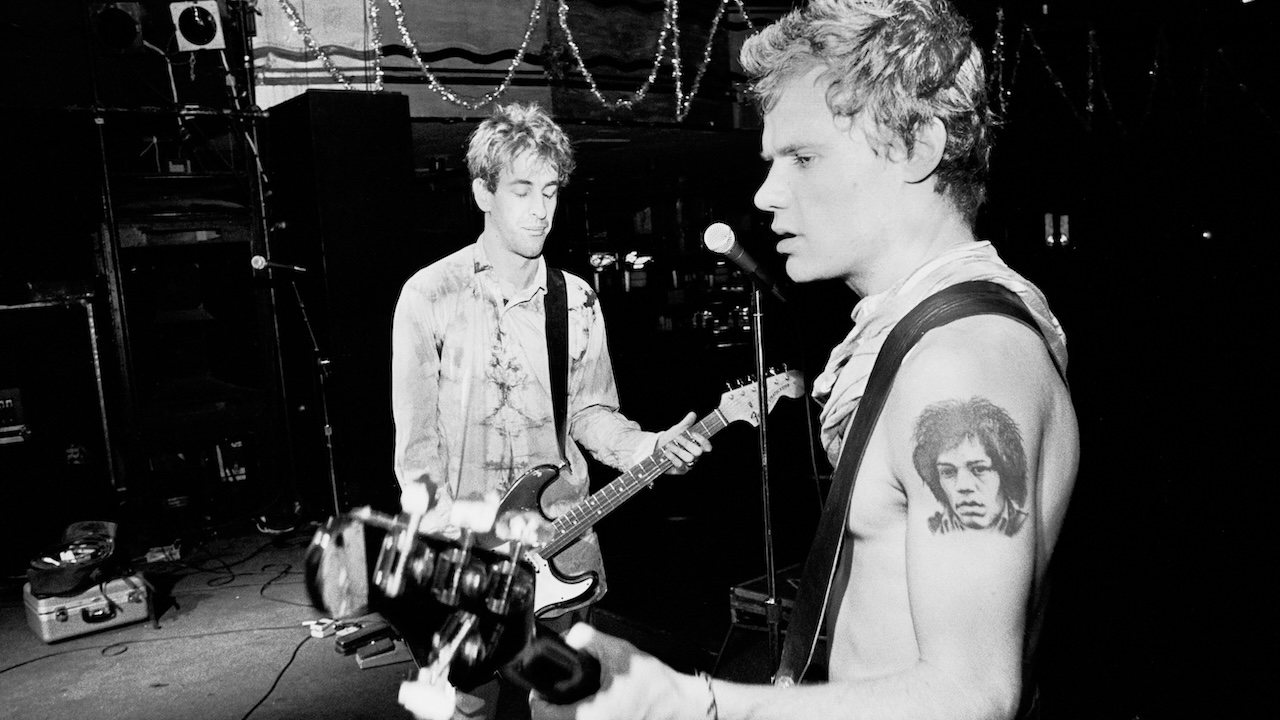Punky supergroup Sharks return with new music
The supergroup that split due to super-sized problems is back, but now they’re “old guys playing young man’s music”

Select the newsletters you’d like to receive. Then, add your email to sign up.
You are now subscribed
Your newsletter sign-up was successful
Want to add more newsletters?

Every Friday
Louder
Louder’s weekly newsletter is jam-packed with the team’s personal highlights from the last seven days, including features, breaking news, reviews and tons of juicy exclusives from the world of alternative music.

Every Friday
Classic Rock
The Classic Rock newsletter is an essential read for the discerning rock fan. Every week we bring you the news, reviews and the very best features and interviews from our extensive archive. Written by rock fans for rock fans.

Every Friday
Metal Hammer
For the last four decades Metal Hammer has been the world’s greatest metal magazine. Created by metalheads for metalheads, ‘Hammer takes you behind the scenes, closer to the action, and nearer to the bands that you love the most.

Every Friday
Prog
The Prog newsletter brings you the very best of Prog Magazine and our website, every Friday. We'll deliver you the very latest news from the Prog universe, informative features and archive material from Prog’s impressive vault.
They have described their career as “a glamorous car crash”, although the only car crash they were actually involved in happened somewhere outside Scunthorpe. But it was in a customised Pontiac with a shark’s fin on the top, so who are we to argue? Formed in 1972 after former Free bassist Andy Fraser hooked up with session guitar ace Chris Spedding and hired unknown Yorkshireman Steve ‘Snips’ Parsons as frontman, Sharks’ short-lived take on the supergroup dynamic was shot through with R’n’B groove, sleazy glam swagger and shaky proto-punk aggression.
Fraser left after 1973’s debut First Water, and sadly passed away last year. But that hasn’t stopped Spedding and Parsons reuniting with original keyboard player Nick Judd, plus Paul Cook on drums and Toshi Ogawa on bass, to prove that pensioners can still rage as hard as anyone against the dying of the light. Spedding and Parsons take up the story…
So Sharks are officially back together – but haven’t you been playing together on and off ever since you split?
Chris Spedding: Pretty much, yeah. When Andy was doing his TV and film music, he would sometimes hire me as a guy to come and play session for him, and we actually re-formed the band for an album back in the 90s because we were both living in LA at the same time. More recently we had another band called King Mob, so we thought, “Why not do Sharks again, with the aim of doing what we started out doing, as a stripped-down rhythm and blues band?” We’ve even got a couple of tracks that should have gone on the third Sharks album, but it never got released. We’ve been doing gigs with fifty-fifty old and new material and people have responded really well to both.
The single is called One Last Thrill. Does that theme chime in with your own attitude to this re-formation?
Steve ‘Snips’ Parsons: Yeah. I mean, I’m 65 and Chris is 72. Sharks is young man’s music played by old guys. It’s adrenaline-fuelled so we’re not going to be able to continue doing that forever. Most guys our age make what I would call armchair music. People like Clapton make music that’s very cosy and everything is wonderful – that’s not Sharks. We’ve been very diligent in recreating the semi-chaos that is Sharks, both live and on the record, but we can’t do that forever. So for us it’s certainly a last hurrah.
Looking back on your original incarnation, was it as much of a car crash as you’ve described it?
Sign up below to get the latest from Classic Rock, plus exclusive special offers, direct to your inbox!
SP: Oh my gosh, I’ve just been going back through it to make a documentary and it makes you realise what a mess it was. Four different managers, four line-ups, all in the space of two years. There were drugs, arguments, accidents… but it was an inflated situation. Tremendous amounts of money and attention were spent on a band and we didn’t initially justify that. By the time we did justify it, it was about 18 months later and we’d already blown most of our chance.
There was tremendous greed after Led Zeppelin really went massive in around 1971 and everyone wanted a piece of the supergroup thing. Free had done All Right Now and initially it was marketed as Andy’s new solo project.
CS: I’d never been in a band before and we thought, “Andy’s been in a big band before so he’ll be able to guide us.” But we were signed to Island Records, we had Island management and Island publishing, not realising how stupid that was – I mean, how can you ask Island management to ask Island Records and Island publishing whether all the bills are being paid? We were so naïve – we even got Island’s lawyers to make up our contract!
Then after your first album, Andy left the band. Musical differences?
SP: I’ve got tremendous respect for Andy – this is the guy who wrote All Right Now – but he said after he left Sharks, “I wanted to sing in the band.” Well, before they hired me they tried out Robert Palmer and Leo Sayer, and he never mentioned it, then he leaves and says he wanted to be the lead singer! So I had a weird time with him. Also, I’ve got to be ruthless about this, I look at the songs he put up for First Water and they were decent songs, but not his best. The songs I wrote, the band liked more, and that didn’t sit very well.
Was part of the difference between yourselves and Andy the image of the band?
CS: Yeah. I mean, the glam thing didn’t suit Andy, but our first exposure was supporting Roxy Music, so we picked up a little bit on that tour. Andy didn’t like that idea – I think he thought it wasn’t serious music – but with any of those little fads and fashions, there’s some good stuff in it.
SP: You’ve got to understand that at that time the guy was incredibly wealthy with royalties from Free. Yet he wanted to dress down, and that grated on me. If I have half a million quid in my pocket I’m going out dress up and have a funky good time. Spedding had the same idea. The Shark car was actually his car. When I said to him one time, “Chris, what were you thinking buying an American car you couldn’t drive and you couldn’t park in London in 1971?” he said, “Well, I was doing really well with the session work and I thought I ought to show it.”
Now right there is the difference between Spedding and Andy Fraser. And I find his a more honest response. It was the same when I met other rock stars. I remember meeting Jon Anderson from Yes and he was wearing this stinking old jumper with holes in it, and I thought, “Why do you dress like this when you’re clearly a very rich man?” I’d be like Richard Gere in American Gigolo, with a wardrobe full of a hundred shirts!
Then you hired Busta ‘Cherry’ Jones to replace Andy, and he looked more flamboyant than any of you!
CS: Oh yeah. I remember he wore this leather jacket and glitter boots, and that helped us establish our look even more.
But, of course, the car met a sad fate…
CS: Yeah, we ended up crashing that after a gig and Andy was injured. I think he took that as his cue to leave the band! I think he saw it as a symbolic event. It’s a bit unfortunate, and that’s why we refer to the whole band being a bit of a car crash, so we want to do it a bit better this time, with no one getting hurt!
Did you hear your influence in the punk scene that followed you? For instance, The Clash’s Should I Stay Or Should I Go sounds uncannily like Sophistication…
SP: Listen, I’ve been aware of that, shall we say, ever since I heard it, but I never had a problem with it. Mick Jones took the same chords and my groove and added his own certain way of approaching things – now that’s standard in rock’n’roll if you ask me. I’ve taken chord structures and made something of my own with them.
We felt fairly out on our own back then. I think the only group I can think of in the same framework was maybe the Feelgoods – they had that sense of irritation to get this stuff whipped into shape.
Steve, you went on to join the Baker Gurvitz Army. How did working with the notorious Ginger Baker turn out for you?
Anybody who’s seen the documentary about him sees Ginger in a certain way, and yes, it’s true, he can be like that. But I worked with Ginger for three years and had no problems. Most of the people who have a problem with Ginger are either stupid or greedy. He had a very short fuse, and those people who have had run-ins with him, if they’d been smart they wouldn’t have pressed his buttons.
As for the film [2012’s Beware Of Mr Baker], if you notice, the guy sold the film on the back of the fact he got attacked by Ginger, and interestingly enough, he got attacked on the last day of shooting, in the car, when the camera was perfectly placed to capture it. He set it up because he knew Ginger is not hard to provoke and he knew there’s a red light you don’t cross, or there’ll be trouble.
Ginger was like a father figure to me. He took the time to teach me and I ended up working with him in African drum choirs and that kind of thing. A great teacher, a great bandleader – I’ve got no problem with him. In fact, there’s a rumour I might play with him again soon. I can’t confirm that, but I can confirm that he is the world’s greatest drummer.
Johnny is a regular contributor to Prog and Classic Rock magazines, both online and in print. Johnny is a highly experienced and versatile music writer whose tastes range from prog and hard rock to R’n’B, funk, folk and blues. He has written about music professionally for 30 years, surviving the Britpop wars at the NME in the 90s (under the hard-to-shake teenage nickname Johnny Cigarettes) before branching out to newspapers such as The Guardian and The Independent and magazines such as Uncut, Record Collector and, of course, Prog and Classic Rock.

